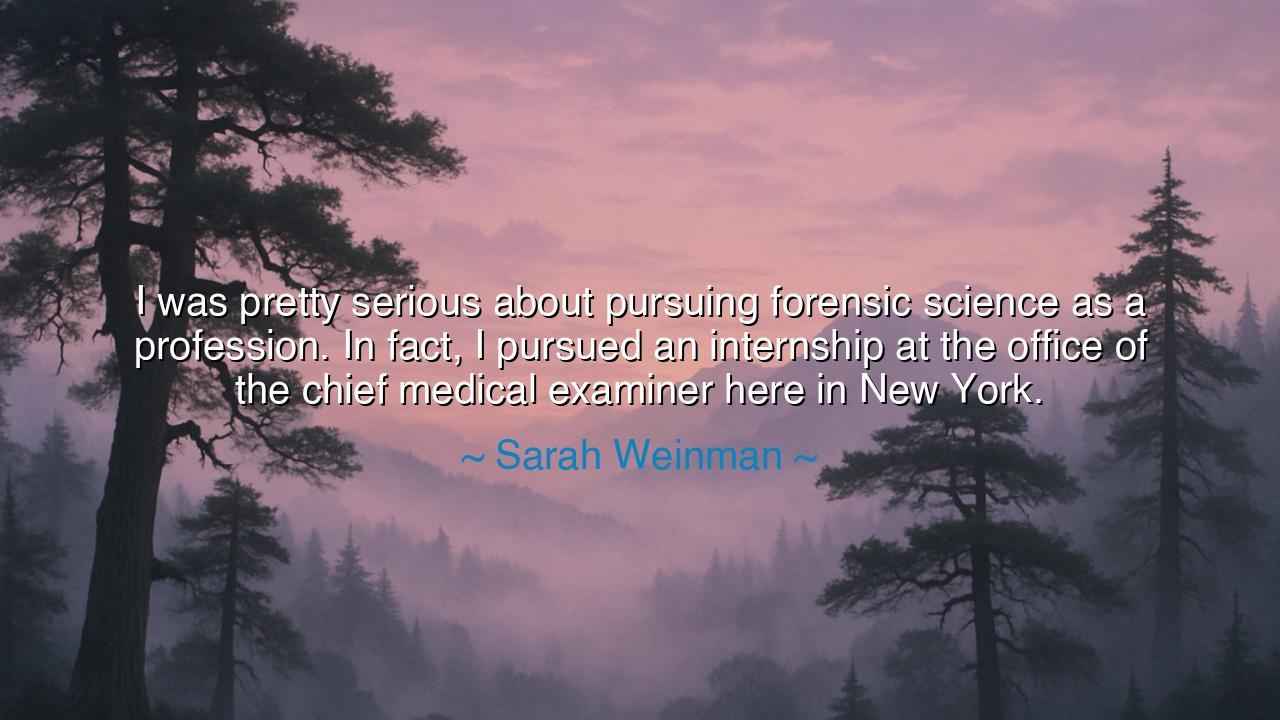
I was pretty serious about pursuing forensic science as a
I was pretty serious about pursuing forensic science as a profession. In fact, I pursued an internship at the office of the chief medical examiner here in New York.






The words of Sarah Weinman—“I was pretty serious about pursuing forensic science as a profession. In fact, I pursued an internship at the office of the chief medical examiner here in New York.”—reveal the sacred tension between curiosity and vocation, between the heart’s early dreams and the paths life ultimately unfolds. They speak of a time of formation, when one stands at the threshold of possibility, guided by a hunger for truth and the courage to face the darker corners of existence. In her reflection, Weinman does not merely recall a career aspiration; she unveils the soul of the investigator—one who seeks knowledge not for power, but for understanding. To choose forensic science, the study of death to protect the living, is to walk the border between shadow and illumination.
To understand the spirit behind her words, one must recognize that forensic science is not merely a trade, but a calling to confront the mysteries that others would rather turn away from. Those who work in the office of the chief medical examiner stand as modern-day priests of truth, guardians of stories the dead can no longer tell. Their duty is not to judge, but to reveal. For Weinman to seek such an internship was an act of moral courage—a declaration that knowledge must not fear the grave, and that truth, however grim, is a light that must not be extinguished. In the ancient world, seekers of truth often went into darkness to find revelation; the oracles of Delphi, the healers of Egypt, even the philosophers of Greece understood that wisdom begins where comfort ends. Weinman’s pursuit follows that same lineage.
The origin of this quote lies in Weinman’s early journey before she became known as a writer and chronicler of true crime. Her fascination with forensic investigation was born from the same impulse that would later drive her storytelling: a devotion to uncovering what lies hidden beneath appearances. To study death, after all, is to study life’s most absolute truth—the final consequence of every act, every injustice, every mystery. Her decision to step into the halls of New York’s medical examiner’s office was not the curiosity of a student, but the awakening of a philosopher. It was there, among cold rooms and silent witnesses, that she learned the humility of knowledge: that science, no matter how advanced, must serve compassion and clarity, not vanity or spectacle.
Her journey mirrors that of Marie Curie, who also walked fearlessly into realms of unseen danger in her search for truth. Curie, handling radioactive elements before their peril was known, sought to understand the invisible forces that governed the material world. Like Curie, Weinman’s interest in the forensic sciences was not morbid curiosity—it was reverence for the hidden architecture of reality. For every mystery solved in the lab is not merely an academic triumph, but a moral one: it restores voice to the voiceless, justice to the forgotten, and meaning to the chaos of loss. To confront death scientifically is to defend life spiritually.
But beyond its literal meaning, her reflection also reveals a deeper truth about the paths we do not take. Many who begin with one calling find themselves led elsewhere, not through failure, but through evolution. Weinman’s devotion to forensics was not abandoned—it transformed. The precision of science became the precision of writing; the discipline of the investigator became the discipline of the author. Her pursuit of facts in the lab gave way to her pursuit of truths in narrative. Just as the ancient scholars of Alexandria sought to unite medicine, philosophy, and art into one vision of the human condition, so too does her journey remind us that no knowledge is ever wasted. What one learns in the study of death may later illuminate the meaning of life.
Her story teaches us the sacred virtue of serious pursuit. In every life, there comes a season of preparation, when curiosity must be tested through discipline. To be “serious,” as Weinman says she was, is to treat one’s interest with respect—to enter the temple of learning not as a tourist, but as a pilgrim. Whether one studies medicine, music, law, or literature, the lesson is the same: devotion transforms talent into destiny. The world honors those who commit themselves fully to the path before them, even if that path later branches into another. The ancients would call this aretē, the excellence of soul born from perseverance and purpose.
From Sarah Weinman’s reflection, we inherit this wisdom: that the pursuit of truth—whether through science or story—demands both courage and humility. The work of understanding life requires us to face death; the work of justice requires us to face the uncomfortable; and the work of wisdom requires us to face ourselves. Each step taken in honesty, no matter how small or temporary, contributes to the great architecture of character. For though she may not have become a medical examiner, Weinman’s spirit of inquiry endures, teaching us that every calling we follow, even briefly, leaves a mark upon our soul.
So let her words be a guiding flame for all who stand at the crossroads of ambition and purpose: pursue knowledge with seriousness, for even if the path changes, the discipline remains. Enter every calling as though it were eternal, and let curiosity be your compass, not fear. For in seeking truth—whether in the lab, the courtroom, or the page—you honor the divine order of the world: that light, even when it shines upon the darkest mysteries, is still light, and every act of learning is an act of courage before the infinite.






AAdministratorAdministrator
Welcome, honored guests. Please leave a comment, we will respond soon